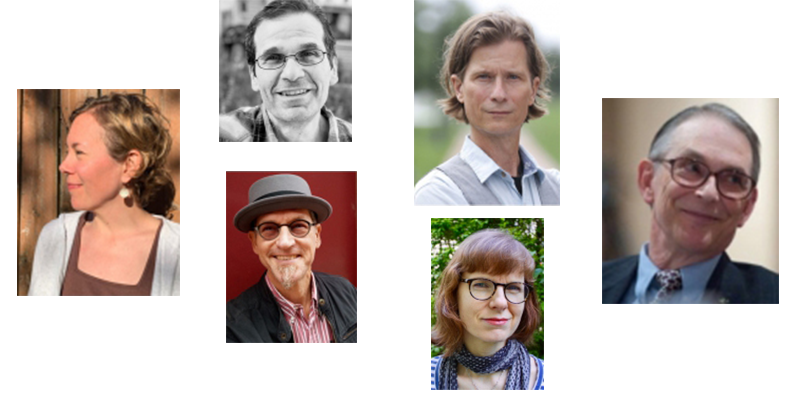In his memorial for Robert Frost, President John F. Kennedy famously observed that poetry reminds us of our limitations, but it can also cleanse us of all kinds of corruption. “The great artist,” Kennedy wrote, “is thus a solitary figure.” Poetry has that kind of power.
Champaign-Urbana is teeming with talented poets and artists of all styles and from all backgrounds. Our Glass Room Poets, including writers Robert Manaster, James Engelhardt, Elizabeth Majerus, Emily Kerlin, Matthew Murray, and John Palen gave the community a much-needed poetry reading sponsored by the Urbana Free Library on May 8th. Yes, it was on Zoom and I know you just rolled your eyes. But it was a truly moving experience because it was on Zoom, even though it took place on a stunningly gorgeous Mother’s Day afternoon. I’m sad to report it wasn’t recorded but that gave the reading all the more spontaneity and reminded me of both the solitary nature of the artist in his or her own Zoom square, but also of the cleansing property of poetry.
I love readings on Zoom. I’ve participated in readings on Zoom and have been an audience member for dramatic and poetic readings on Zoom and I adore the format. It’s the best of all worlds. Watching Elizabeth Majerus read from her upcoming chapbook Songs are like Tattoos, a series of poetic companion pieces to Joni Mitchell’s Blue, from her own home felt more intimate and gave the poems a personal resonance. Each poet read from different spaces and emphasized highly individualized images and tones. Emily Kerlin’s beautiful imagery felt homespun with references to emerging crocuses and the daily ordinariness of the navel orange. And yet–those ordinary images felt extraordinary in the reading and with the addition of each poet’s own background and lighting. Zoom can make poetry even more, what’s the word? Poetic.
Majerus, Director and Principal at University High School, and member of local indie rock band Motes, is a busy artist, administrator, and community member. I asked how she manages to write such stunning poetry and keep up with all the work and life details. “I make sure that I take a weekend every few months to hole up alone somewhere and do nothing but write––that has been a lifesaver and has helped me maintain poetry momentum.”
Manaster, an editor at Cider Press Review and gifted poet, is one of the founders of the group. While he’s been in several other writing groups across town, including participating in the Red Herring Fiction Workshop (which welcomes writers in multiple genres), his work with this recent configuration of poets has been incredibly generative.
I asked Manaster about how poetry helps create a sense of community, no matter the format or circumstance.
Manaster responded, “I’ve found that the poets in our community here have been committed to the craft— both in writing as well as in responding to each other’s work in constructive ways. We have talented writers and readers! The poetry community has been supportive and encouraging. It’s also been welcoming to any writer. There’s a place for the beginning writer as well as for the more experienced writer. There’s a lot of diversity in the styles of the poets in this town and that’s a strength in this community. There could be even more diversity, which would benefit our community as a whole. I’d love to see more outreach (in both directions) between our poetry community with the University of Illinois, Parkland College, and the local schools, whether it be getting the word out and attending readings or inviting poets to workshops.”
All of the readings were perfect examples of how poetry heals the wearied soul. James Engelhardt opened the afternoon with memories of his time in Fairbanks, Alaska, as well as other beautiful poems from his published collection, Bone Willows. Matthew Murray read “The Red Bus,” an adaptation/response to William Carols Williams’ iconic “Red Wheelbarrow.”. And John Palen closed the reading in the spirit of “Tikkun Olam,” reminding us it is our human obligation to repair the world.
Repairing the world with poetry may sound a bit far-fetched. But every spiritual tradition has poetry at its center and every community is enriched that has active and engaged artists at its center. Poetry literally brings us together during festivals like our own Pygmalion festival, which routinely includes readings from both local and nationally-known writers. Public readings of poetry reach far back into ancient history. Poetry and story, whether sung, read aloud, or acted on stage, are essential elements of our shared humanity.
If you’re interested in learning more about the Glass Room Poets, you can contact them via the Urbana Free Library, where they meet, during normal times, you guessed it, in a glass room. Both the Champaign-Urbana Poetry Group (always welcoming and generative) and the Red Herring Fiction Workshop have active Facebook pages with contact information and upcoming events.
And if you’re a PBS/WILL supporter and/or Passport holder, be sure you catch-up on the three wonderful seasons of Poetry in America. The interviews and insights about some of our most precious national resources, our poets, will convert you to poetry as healing, as justice, and as truth.
Poetry is language that examines who we are and what we can be. We’re lucky to have so many poets living and working in Champaign-Urbana. Invite them to a Zoom room near you and be on the lookout for more readings and events this summer and into the fall.
Next up from the Urbana Free Library: Poems Across Urbana Quatrain Writing Workshop Saturday, May 21st, from 3-4 p.m. at Crestview Park in Urbana.








